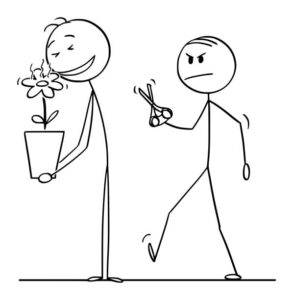
Jealousy is a complex emotion deeply rooted in human psychology. It’s a universal experience, and throughout history, literature, music and art, jealousy has been portrayed as a powerful force. It has resulted in the shaping of human behaviour in both positive and negative ways.
What is jealousy?
Jealousy is an emotion that can arise in various contexts, from personal relationships to professional environments. At its core, jealousy is often linked to feelings of inadequacy, fear of loss, and the perceived threat of losing something valuable (such as a relationship, status, or possessions).
By understanding its various facets, triggers, and manifestations, individuals can navigate and address jealousy in a constructive manner. Whether in personal or professional settings, acknowledging and managing jealousy is a crucial step toward building healthier relationships and fostering personal growth.
Evolutionary Perspective
From an evolutionary standpoint, jealousy can be seen as a mechanism designed to protect valuable resources, such as a mate or social status. In the ancestral environment, those who guarded their relationships and resources were more likely to pass on their genes, contributing to the survival of their offspring.

Forms of Jealousy
Jealousy is not a one-size-fits-all emotion; it comes in various forms. Romantic jealousy, for instance, can be triggered by a perceived threat to a romantic relationship, while professional jealousy may stem from competition in the workplace. Understanding the specific type of jealousy at play is crucial in deciphering its underlying causes and addressing it effectively.
Insecurity
In many cases, jealousy is closely tied to feelings of insecurity. Individuals who struggle with low self-esteem or have unresolved past traumas may be more prone to experiencing intense jealousy. These underlying insecurities can fuel irrational thoughts and behaviours, creating a self-perpetuating cycle of jealousy.
Social and Cultural Influences
The way jealousy is expressed and perceived can also be influenced by social and cultural factors. Cultural norms and societal expectations play a significant role in shaping how individuals experience and express jealousy. Understanding these influences can help shed light on why certain individuals or societies may be more prone to jealousy than others.

Impact of jealousy on Relationships
Jealousy can have a profound impact on relationships, often leading to strained communication, increased conflict, and, in extreme cases, the deterioration of the relationship itself. It’s crucial for individuals and couples to recognize and address jealousy in a healthy manner, fostering open communication and building trust.
Coping Strategies for Jealousy
Developing effective coping strategies is essential for managing jealousy. This may involve cultivating self-awareness, practicing mindfulness, and building self-esteem. Additionally, couples can work together to establish trust and open lines of communication, creating a supportive environment that reduces the likelihood of jealousy spiraling out of control.
Useful websites
The deeper meaning of jealousy: a psychological exploration
The evolutionary psychology of envy and jealousy
Simply psychology – why am I so jealous?
BBC Science focus – where does jealousy come from?
12 tips to let go of jealousyMindfulness tips for when we feel jealous



